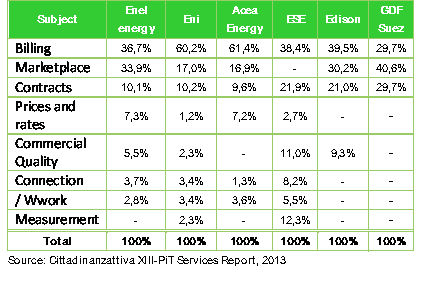Unclear bills and mind-boggling adjustments: today in Rome presented the report of Active Citizenship "Pit Services, 2013: Energy intermittently"
Unclear bills and mind-boggling adjustments: these are the "voices fixed" that unite the billing of electricity, gas, water and waste, and bring into serious difficulties for Italian families already struggling with the crisis and the collapse of income.
To denounce it the report "Energy intermittently" - XIII Report PIT Services presented today by Cittadinanzattiva. About 9,633 reports of citizens, collected by national and local PIT Services in 2012 to 30% to the energy and environment sector (water and waste) which is dedicated to the focus presented today.
Electricity and gas. In 2012, alerts reached the PiT services relating to energy concern for 73.5% of the electricity (it was 55% in 2011) and the remaining 26.5% gas (45% in 2011).
Almost half (44.6%) of the reports refers to billing problems, in particular too high adjustments (38.3% in scope gas, 28.5% in scope electricity) with average amounts of 2500 euro that can reach € 6,500 in the case of electricity and as many as 8,000 € in the case of gas. Follows the "market" (20.5%) which includes in cases of violation of the code of business conduct (81.8% for electric power, 41.2% for natural gas), with particular regard to contracts not required and the failure to respect the right of withdrawal, the issues related to the change of supplier and cases of double billing. 13.2% of alerts refers to "contracts", in particular the excessively long times for applications for withdrawal or discontinuation supply (42.1% for natural gas, 33.3% for electricity), the delivery and respect of the planned technical and economic conditions, to requests for volture / take over, with disconnections for non-payment or reduction in power, to requests for increased power and failure to respond to complaints by companies. Follows the voice "prices and fees" (7.5%) with high tariffs for the supply of electricity and gas, and reports on the lack of transparency and comparability of commercial offers.
Here are the Top Issues with reference to the companies for which Cittadinanzattiva received more contacts from citizens.

Water service. Some data in context: 30% of the population is devoid of the treatment service, the dispersion of the water network is an average of 35%, 9.5% of families complains irregularities in the supply of water and only 56% of the investments expected to remedy the lack of infrastructure has been realized.
Within this framework are well placed reports of citizens that in 46% of cases (compared to 40% in 2011) refers to the billing, with particular regard to the adjustments and incorrect billings, even in this area (made on the basis of counter pain functioning or consumption estimates only). 17% of citizens have also complained about a marked increase in water tariffs in confirmation of the statements by the Observatory Prices and Rates of Cittadinanzattiva: 2007-2011 rates have increased by over 25%, with increases well above average in the Valle d’Aosta (+57%), in the Marche region (+40.4%), Tuscany (+38.1%), in Friuli Venezia Giulia (+37%), in the Veneto region (+32.4%), in Emilia Romagna (+30%) and Umbria (+28%).
|
Region |
Variation 2007/11 |
|
Abruzzo |
+2,4% |
|
Basilicata |
+22,3% |
|
Calabria |
+5,8% |
|
Campania |
+14,2% |
|
Emilia |
+30,0% |
|
Friuli |
+37,0% |
|
Lazio |
+19,0% |
|
Liguria |
+18,5% |
|
Lombardia |
+22,0% |
|
Marche |
+40,4% |
|
Molise |
+0,0% |
|
Piemonte |
+23,6% |
|
Puglia |
+18,1% |
|
Sardegna |
+22,8% |
|
Sicilia |
+17,0% |
|
Toscana |
+38,1% |
|
Trentino |
-13,0% |
|
Umbria |
+28,0% |
|
V. d'Aosta |
+57,0% |
|
Veneto |
+32,4% |
|
Italy |
+25,3% |
Source: Cittadinanzattiva - Observatory prices and rates, 2012
13% signals the interruption of the service, and 8% of citizens continues to report problems with maintenance. A further 8% of those reporting in, living in areas not served by sewage treatment, is still waiting for the refund of amounts unduly paid. Finally, 7% of the citizens we noted problems with drinking water.
Municipal solid waste. The billing is confirmed as the main disservice reported by the citizens even in the case of waste, with a marked increase compared to 2011.
|
Municipal solid waste |
2012 |
2011 |
|
Billing |
30% |
5% |
|
Fare increase |
20% |
35% |
|
Separate collection |
20% |
20% |
|
Condition bins |
12% |
17% |
|
Irregular collection service |
9% |
14% |
|
Inadequacy of the ecological islands |
9% |
9% |
|
Total |
100% |
100% |
Source: Cittadinanzattiva XIII-PiT Services Report, 2013
On the subject of billing, 72% of citizens complains not returned the VAT paid on Tia and not due, as established by the Constitutional Court in 2009 and reaffirmed by the Supreme Court in 2012, 22% complain about a lack of transparency in billing documents and remaining 6% instead signals the difficulties in recover the sums paid on the basis of erroneous calculations by the operator.
It weighs the fare increase, especially in light of the inefficiencies of separate collection (both with 20%). As noted by our Observatory Prices and Rates, between 2011 and 2012 rates of waste increased by an average of 3%, but with cities that have also recorded double-digit increases:
|
Cities with aumentia “2 digits” |
Annual amount 2012 |
Annual amount 2011 |
Variation |
|
Bari |
€314 |
€242 |
30% |
|
Messina |
€306 |
€251 |
22% |
|
Firenze |
€214 |
€177 |
21% |
|
Novara |
€193 |
€162 |
19% |
|
Avellino |
€255 |
€221 |
16% |
|
Trapani |
€283 |
€245 |
15% |
|
Milano |
€299 |
€262 |
14% |
|
Catanzaro |
€194 |
€176 |
10% |
Source: Cittadinanzattiva - Observatory prices and rates, 2013
In the description is added the 12% of reports on the poor condition of the bins, 9% on the irregularity of the collection service and an insufficiency of the remaining 9% ecological islands.
"From the reports of citizens, once again, it appears that the empowerment of the consumer, understood as essential value for the adjustment of the system, may be the greatest strategic axis in these areas," these declarations of Tina Napoli, responsible for the network consumer policies Cittadinanzattiva. "In the energy sector, as proposed by Sen," continued Napoli, "citizen participation is forcing institutions and companies to ask new questions, as the citizens themselves can contribute to the development of the country with the production of energy. In the context of waste disposal, to achieve the European objectives and to implement the strategy of "Zero Waste 2020 ', it is necessary the responsible involvement of communities. For the water service, the engagement of citizens in the evaluation of service would help to raise the awareness of local communities on the use of water as a common good and how they are invested resources for the service. Only through an extended governance, you can start a virtuous cycle, using new technologies to develop greater awareness and allowing the exercise of the power to choose even for the most vulnerable consumers”.












